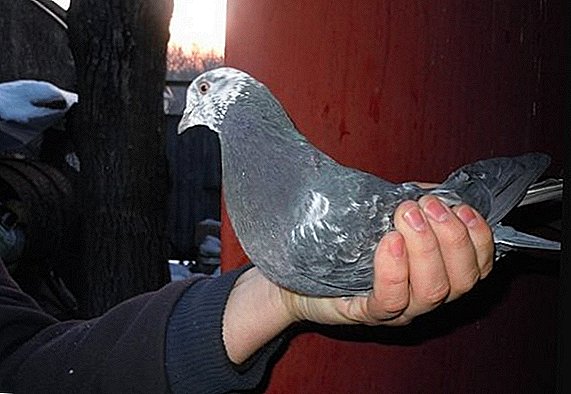
Variety pears "Lemon" very easy to grow: her tree is extremely unpretentious to environmental conditionsand also does not require mandatory special care, therefore suitable for most summer residentswho would like to have on your site pears.
Pears of this variety have a distinctive sourish flavor, for which they got their name.
What kind of pears refers?
Pear "Limonka" - one of the most famous and widespread varieties. Refers to to summer. Mostly found in Ukraine, in central Russia, in its western regions and in the Volga region.
To the summer pear varieties also belong: Rogneda, Rossoshanskaya beautiful, Duchess, Skorospelka from Michurinsk and Severyanka red-cheeked.
Breeding history and breeding region
 The history of breeding the original variety is not known for certain, but it is obvious that it has existed for quite a long time and is obtained in popular selection and is still local today. Lower Volga grade.
The history of breeding the original variety is not known for certain, but it is obvious that it has existed for quite a long time and is obtained in popular selection and is still local today. Lower Volga grade.
Under the name "Lemon" can hide various varieties of the same variety, with only minor differences, which mainly relate to the time of ripening and storage of fruits.
Pear "lemon": description of the variety and photos
Fruit
- the size is small weight from 60 to 100 g;
- monotonous yellow color (lemon), small dots under the skin all over the fetus;
- the form rounded;
- the skin is dry and thin;
- pulp from greenish to light yellow, dense.
Tree
- grows heavily (up to 6 m in height and crown width);
- the crown is not very thicksprawling bark smooth;
- leaves of a dark shade, wavy, in the form ovoid;
- shoots medium in size, dark brown.
For more information about the pear lemon "lemon" can be in the photo below:





Specifications
High endurance. Pear "Limonka" easily transfers harsh winters mid-latitudeand also has a good resistance to disease and pests.
Pear varieties are distinguished by good frost resistance: Yakovlevskaya, Tikhiy Don, Larinskaya, Perun and Otradnenskaya.
 //selo.guru/ptitsa/bolezni-p/gribkovye/parsha.html rarely occurs, but there is danger of septorium and fillostikta.
//selo.guru/ptitsa/bolezni-p/gribkovye/parsha.html rarely occurs, but there is danger of septorium and fillostikta.
The yield is significant and stable.
Fruiting begins 7-8 years after planting a tree.
Fruits are removed late July and Augustbut there are cases sloughing fruit before maturity.
Harvested ripe pears stored for about a week.
For high-yielding varieties of pears include: Svetlyanka, Tatiana, Bere Russkaya, Fairy Spectacle and Marble.
Planting and care
As already mentioned, "lemon" is very unpretentious to the conditions of growthHowever, it is better to follow general guidelines for planting and care to protect your garden and crop from harm.
Choose a loose soil for planting - air and water should flow freely to the roots. You can sit both in spring and autumn.
After digging a hole, place a seedling into it, gently spreading the roots around the circumference, then sprinkle it with the excavated soil of the upper layer, previously mixing it with mineral fertilizers and ashestamp. The root part should be a couple of centimeters protrude from under the resulting mound.
After landing is finished, evenly water the seedling with two buckets of water and tie it to a narrow sturdy stick (peg). Carry the garter carefully, without over-pulling the yet fragile plant.
As pollinators Nearby you can plant pears of the varieties “Ilinka”, “Klapp's Lover”, “Tonkovetka”.
 Regular watering is carried out in autumn and spring. - several times per season. To carry out this procedure, make around the trunk of a narrow ditch (10-15 cm) and slowly pour water into it.
Regular watering is carried out in autumn and spring. - several times per season. To carry out this procedure, make around the trunk of a narrow ditch (10-15 cm) and slowly pour water into it.
It takes about three buckets per square meter near the trunk area. Do not forget loosen the soil to improve root aeration.
If you are interested in how to close the lemon pears for the winter, then there is no need to carry out special procedures. But with the appearance of snow, you can more tightly cover with them the base of the young sapling's trunk.
Mineral fertilizers can be added to the soil once a year, organic - no more than once every three years. Fertilizers are also introduced in a circular trench, interspersed with the ground.
Potassium chloride is recommended as a mineral fertilizer, and humus and urea as organic fertilizers.
Diseases and pests
Though "Lemon" and resistant to various pests and diseases it is necessary to present possible threats and pre-plan preventive measures.
//selo.guru/ptitsa/bolezni-p/gribkovye/parsha.html. It develops as a brown deposit on the leaves, on the fruits manifested by multiple dark dots. The probability of occurrence is low.
Mealy dew. Looks like the name: white rash affects all parts of the plant.
 Fruit rot. Immediately affects the fruit - extensive dark spots make them unsuitable for use. All diseases spread to the nearest trees, so do not start your garden and carry out the treatment on time.
Fruit rot. Immediately affects the fruit - extensive dark spots make them unsuitable for use. All diseases spread to the nearest trees, so do not start your garden and carry out the treatment on time.
Weeds. Perhaps the main type of pests that threaten this variety of pears. Do not allow the emergence of weeds in a young tree, and especially immediately after planting, otherwise they will deprive the sapling of the necessary amount of nutrition and moisture.
Summarizing, we can say that "Lemon" - great pear variety suitable for growing in your own garden especially if this is your first self-planted tree.
Among the unpretentious varieties of pears should also pay attention to the Red-sided, Hera and Cathedral.
Variety is considered to be table, but it is quite possible to dry the fruit, as well as use in cooking. The abundant and regular harvest inherent in this variety will delight you every season.












